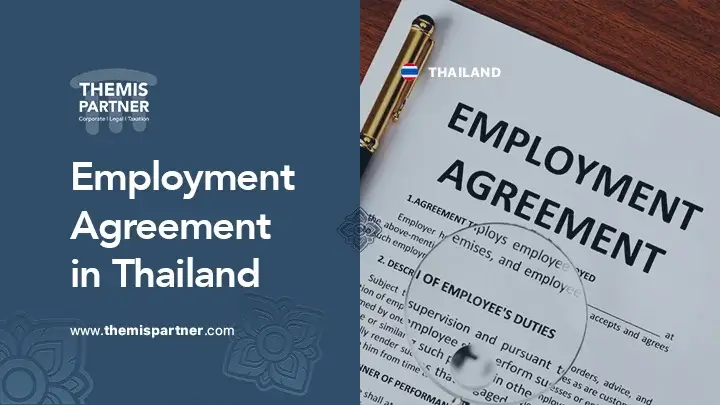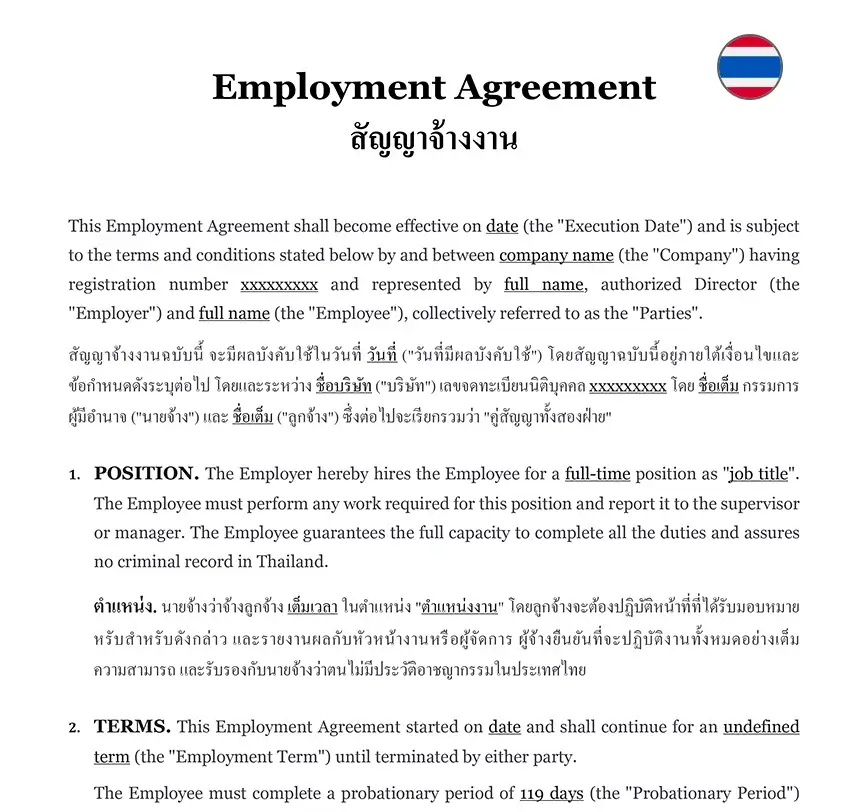For business owners and HR professionals seeking clarity, understanding how to draft an employment agreement in Thailand is essential to protect your business and your workforce.
A well-structured contract is not just a formality: it is your primary safeguard against misunderstood job roles, compensation disputes, or costly litigation. With Thai labour regulations evolving regularly, a clear and current employment agreement ensures compliance and minimizes risk, regardless of company size.

Whether hiring local talent or expatriate employees, the right contractual framework offers transparency for both sides. Here’s how to create contracts that safeguard your interests and support a strong team from the very first day.
Key Takeaways
- Always use written contracts in Thailand to clarify terms and prevent disputes.
- Include mandatory clauses on pay, hours, leave, probation (≤119 days), and termination.
- Keep contracts compliant with current wage, social security, and severance laws.
- Use clear language and include confidentiality, IP, and non-compete protections.
- Provide Thai or bilingual versions and customize terms for foreign employees.
Table of Contents
-
Employment Agreement Laws in Thailand
-
Key Clauses in Thai Employment Contracts
-
Thai Language & Translation Rules for Contracts
-
Fixed-Term vs. Indefinite Employment Contracts
-
Employment Contracts for Expatriates in Thailand
-
FAQ: Employment Agreement in Thailand
-
Conclusion
Employment Agreement Laws in Thailand
Mandatory Legal Provisions in Thai Employment Contracts
Under Thailand’s Labour Protection Act B.E. 2541 (1998) and the Civil and Commercial Code, employment agreements can be written or oral, but a written contract is strongly advised for clarity and dispute prevention.
A valid employment agreement should include at a minimum:
- Full names and contact details of both employer and employee
- Detailed job title and responsibilities
- Work location and reporting structure
- Compensation, including salary, overtime, and benefits
- Working hours and rest periods (not more than 8 hours/day, 48 hours/week)
- Leave entitlements (minimum 6 days paid annual leave after one year)
- Probation period (commonly up to 119 days)
- Termination conditions and process, including statutory severance pay
For more information, review the Thai Ministry of Labour.
Statutory Rights & Employer Obligations Explained
Employers must uphold mandatory rights such as:
- Minimum wage (set annually)
- Maximum work hours and mandated rest periods
- Paid annual leave and public holidays
- Social security and statutory benefits
Failing to meet these benchmarks can result in fines, compensation orders, or reputational harm.
To remain compliant, conduct annual reviews of employment agreements
A Thai employment contract that is clear, current, and compliant helps protect both employers and employees from avoidable disputes.
Looking to outsource HR & payroll?
Our team handle payroll, HR administration, PEO employment, and full visa and relocation support.
Key Clauses in Thai Employment Contracts
Essential Clauses for Legal Protection
To draft a clear and lawful employment agreement in Thailand, include all essential clauses that detail both parties’ rights and obligations.
Every agreement should specify:
- Position and comprehensive job description
- Compensation, payment terms, and mandatory social security
- Workplace location and standard working hours (maximum 8 hours/day, 48 hours/week)
- Leave entitlements such as minimum 6 days of paid annual leave after one year
- Benefits, calculation of overtime, bonuses, and allowances
- Detailed probation period (up to 119 days), including terms for extension or non-confirmation
Describe:
- Notice requirements for termination as per Thai law
- Clear grounds for dismissal and statutory severance pay eligibility
- Procedures for early termination in fixed-term contracts to avoid automatic conversion to indefinite status
Use precise and unambiguous language to prevent contractual disputes and ensure every clause is enforceable.
Confidentiality, IP & Non-Compete Clauses
Effective agreements clearly protect business assets through:
- Confidentiality clauses covering sensitive business information during and after employment
- Intellectual property assignment that clarifies ownership of work created in the role
- Non-competition and non-solicitation clauses, kept reasonable in scope, duration, and geography to maximize enforceability under Thai law
Example: A non-compete clause limited to 12 months and directly related business sectors is generally considered reasonable in Thailand.
Regular contract review ensures all employment clauses align with current labour law, company protocols, and operational requirements.
A well-structured agreement sets clear expectations and significantly reduces the risk of costly disputes.
Thai Language & Translation Rules for Contracts
When to Use Bilingual or Thai-Language Contracts
Thai law allows employment agreements to be written in any language, but clear comprehension is essential.
If an employee’s main language is Thai, creating a Thai or bilingual contract helps avoid disputes and ensures both parties fully understand the terms.
Common risks of using only English or another foreign language include:
- Misunderstandings over job roles, compensation, or termination rights
- Employees later contesting unclear clauses in the Thai labor courts
To improve enforceability:
- Clearly state which language version will prevail in case of discrepancy
- Add a dispute clause clarifying that the authoritative text governs
See more on legal contract language at the Thailand Board of Investment – Contract Law.
Ensuring Accurate Translation & Avoiding Disputes
Accurate translation is vital; a minor mistranslation can affect pay, working hours, or legal obligations.
Recommended steps include:
- Use qualified legal translators for complex or sensitive contract clauses
- Arrange certification of translations for important documents
- Avoid ambiguous terms or idiomatic expressions that may not translate clearly
Ensuring clear, accurate bilingual contracts protects both business owners and employees, making expectations transparent and reducing legal risk.
Fixed-Term vs. Indefinite Employment Contracts
Legal Differences & Practical Implications
Choosing between fixed-term and indefinite-term employment contracts in Thailand affects rights, obligations, and business flexibility.
Thai law defines a fixed-term contract as one with a clear end date, while an indefinite-term contract has no preset termination point.
Key considerations:
- Fixed-term contracts: Allow for employment over a set period, suitable for project-based roles.
- Indefinite contracts: Provide ongoing employment until either party lawfully ends the contract.
- Improperly drafting a fixed-term contract such as allowing early termination or automatic renewal can result in legal treatment as an indefinite contract.
A fixed-term contract must have clear start and end dates, or it risks being converted under Thai law.
Review all durations, early exit terms, and renewal clauses for compliance.
Lawful Probation & Termination Clauses
Setting a probation period is common, but must not exceed 119 days to avoid triggering full severance entitlements.
Follow these requirements:
- Define a probationary period in writing (maximum: 119 days).
- Specify notice periods for termination (usually one pay period, unless otherwise allowed).
- Ensure termination and severance pay comply with Thailand’s Labour Protection Act B.E. 2541.
Mistakes can lead to costly severance or legal disputes, so clear structure is key.
If a fixed-term contract is ended early without provision, Thai courts may require statutory severance.
For hiring in Thailand, align contracts with the correct duration, update policies regularly, and verify all termination terms against current statutory requirements. This approach helps protect both your business interests and employee rights.
Download the Employment Termination Letter to end employment legally under Thai labour law.
Employment Contracts for Expatriates in Thailand
Key Clauses for Expat Employees
When drafting an employment agreement for expatriate staff in Thailand, it is essential to address legal requirements and practical needs that differ from local hires.
Key clauses should cover:
- Work permit and visa sponsorship: Specify who handles applications and renewals.
- Relocation support: Outline housing, travel allowance, and moving expenses where relevant.
- International benefits: Highlight differences such as private health insurance or education allowances.
- Tax obligations: Indicate who assumes responsibility for cross-border tax compliance.
Clear documentation of relocation benefits and immigration support is crucial for expatriate agreements.
Including a governing law and dispute resolution clause is highly recommended, especially for employees working across jurisdictions.
Download the Remote Working Contract to set clear terms for remote work under Thai employment law.
Keeping Contracts Updated with Legal Changes
To maintain compliance with evolving Thai labour laws, establish a structured review process for employment agreements.
Recommended steps include:
- Schedule annual legal audits of contract templates using a standardized checklist.
- Involve HR and legal counsel in periodic reviews.
Contracts that keep pace with Thai labour regulations help businesses avoid costly disputes and maintain good standing.
A well-tailored employment contract safeguards both employer and expatriate employee interests, offering clarity and compliance as the legal environment evolves.
FAQ: Employment Agreement in Thailand
Are written employment contracts required by Thai labor law?
No, but using a written contract is highly recommended to prevent misunderstandings and protect both employer and employee rights. Verbal agreements are legal but offer little evidence if a dispute arises.
What key points should employers know when drafting contracts in Thailand?
Essential pointers you need to know:
- Written contracts safeguard your interests and provide a clear framework for resolving disputes.
- Contracts do not have to be in Thai; however, for Thai employees, a Thai-language or bilingual version is critical for legal clarity.
- Employers can include non-competition clauses, but to be valid, they must be reasonable in scope, area, and timeframe.
The maximum probation period permitted under Thai labour law is typically 119 days. Exceeding this might automatically trigger severance rights, increasing risks for employers.
Why is it important to use clear and translated contracts in Thailand?
Picture this: presenting an English contract to a Thai employee who is not fluent: misunderstandings could result in unenforceable terms. Always use clear, simple language and consider professional translation for crucial sections.
Written, comprehensible contracts minimize risk and ensure smoother employment relationships. For Thai legal updates or detailed guidance, visit the Thai Ministry of Labour.
Conclusion
A well-drafted employment agreement is your strongest tool for building trust, setting clear expectations, and protecting your business interests in Thailand’s evolving regulatory environment.
Take the next step now: review your existing contracts, align them with Thai legal requirements, ensure essential clauses are clear, and provide translations where needed. Schedule regular updates to keep your agreements current and enforceable.
Contact us today for precise, practical support in drafting or reviewing your Thailand employment agreements. Themis Partner combines legal expertise with business understanding to help you confidently move forward.


